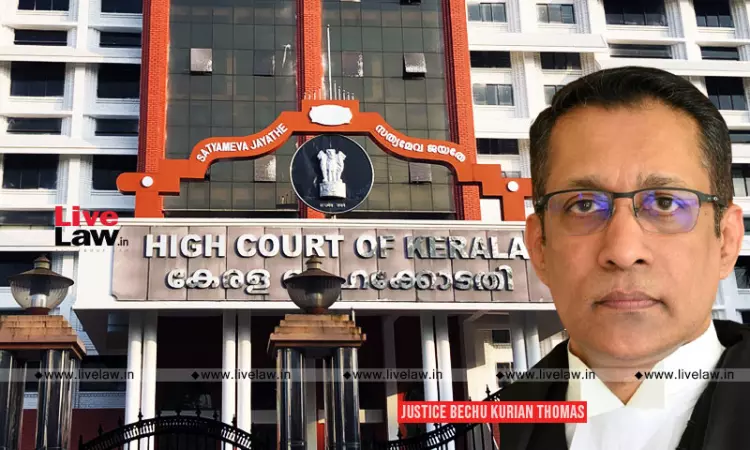- Home
- /
- High Courts
- /
- Kerala High Court
- /
- S.216 CrPC | Addition Of Charges...
S.216 CrPC | Addition Of Charges Has To Be Done By Court Upon Its Own Satisfaction, Not At The Behest Of Parties: Kerala High Court
Tellmy Jolly
16 May 2024 4:52 AM GMT
The Kerala High Court has held that the power to alter or add charges in exercise of power under Section 216 CrPC remains with the Court and cannot be done based on the application of parties. In the facts of the case, the Public Prosecutor applied to the Trial Court to alter the charge and add the offence of trafficking under Section 370 of the IPC against the accused. The Trial Court...
The Kerala High Court has held that the power to alter or add charges in exercise of power under Section 216 CrPC remains with the Court and cannot be done based on the application of parties.
In the facts of the case, the Public Prosecutor applied to the Trial Court to alter the charge and add the offence of trafficking under Section 370 of the IPC against the accused. The Trial Court dismissed the application since the offence of trafficking of a person under Section 370 was incorporated in the IPC by Amendment Act, 2013 and the alleged offence took place in 2006.
Justice Bechu Kurian Thomas held that the order of the Trial Court does not warrant interference since the charge cannot be altered at the instance of the parties.
“Thus, the request for the addition of the charge under section 370 IPC, as it stood prior to 2013, cannot be made at the instance of the prosecution. An addition of charge has to be done by the Court based upon its own satisfaction and not at the behest of any of the parties to the trial.”
In the facts of the case, the Court stated that the earlier provision, Section 370 before the 2013 amendment, would apply.
“However, the Criminal Law (Amendment) Act, 2013, brought into effect from 03-02-2013, replaced section 370 with the provision for the trafficking of a person. Notwithstanding the above substitution, the earlier provision will apply for offences committed until the coming into force of the Amendment Act of 2013.”
Facts
In 2006, the accused promised a cleaning job for two women in a hospital in Dubai. It was alleged that the accused took them to Dubai after taking money from them. It is further alleged that the accused gave intoxicating substances to the women and they were repeatedly raped by the accused and other strangers. The women who managed to escape came back to India with the help of the Indian Embassy.
The women lodged a First Information Report at Thoppumpady Police Station. The final report was filed and the accused was arrayed for committing offences under 420 (cheating and dishonestly inducing delivery of property), 376 (punishment for rape), and 342 (punishment for wrongful confinement) read with section 120B (punishment for criminal conspiracy) of the IPC.
After the commencement of the trial, the Public Prosecutor filed an application to incorporate Section 370 of IPC as an additional offence to be charged against the accused for trafficking of women.
The Trial Court dismissed the prayer to alter the charge already framed since offence of trafficking of a person under Section 370 was incorporated in the IPC by Amendment Act, 2013. It noted that the allegations were made in 2006 before the incorporation of trafficking vide Section 370. Aggrieved by the order of the Trial Court, the State has preferred a criminal miscellaneous case.
Observations
Before the Criminal Law Amendment Act 2013, Section 370 dealt with buying or disposing of any person as a slave
The Court said, “No doubt, though slavery is not defined in the Indian Penal Code, 1860, section 370 IPC provided, prior to 2013, the importation, exportation, removal, buying, selling or disposing of and even the acceptance, reception or detention of a person against his will as a slave, as an offence punishable with imprisonment for seven years.”
After the Amendment in 2013, Section 370 pertains to the trafficking of persons and prescribes penalties for those involved in trafficking.
The Court then went on to explain the meaning of the term slave, slavery. Relying upon the Orissa High Court decision in Dhanurjaya Putel and Another v. State of Orissa (2002), the Court stated that 'slave' and 'slavery' means deprivation of freedom of movement and restraining freedom of expression.
The Court observed that the prosecution revealed that two women were subjected to gruesome sexual exploitation. It stated that a case of slavery coming within the purview of Section 370 IPC was made out by the prosecution since the alleged incident took place in 2006.
“This Court also finds force in the submission of the learned Public Prosecutor that section 370 IPC, as it stood on the date of commission of the offence, can be made out from the evidence of the prosecution witnesses requiring an alteration of charge.” stated the Court.
The High Court stated that the power of alteration of charge is with the Court and cannot be based on the application of the parties. It thus stated that the addition of section 370 for including the offence of slavery could be done based on the satisfaction of the Court and not at the instance of the parties.
The Court thus set aside the order of the Trial Court due to its non-maintainability and directed the Trial Court to independently consider alteration or addition of charge under any provision of law.
Accordingly, the Court dismissed the case.
Counsel for Complainant: Public Prosecutor M C Ashi
Counsel for Respondents: Advocates I V Pramod, Ashik K Mohammed Ali, Jessy George, K V Sasidharan, P K Jayasreethankachi, Saira Souraj P.
Citation: 2024 LiveLaw Ker 289
Case Title: State of Kerala v Azeez
Case Number: CRL.MC NO. 992 OF 2019


